‘A Story of Violence, Bloodshed and Bitter Ironies’
If you can wangle access to the BBC’s iPlayer, a viewing of Adam Curtis’ “Bitter Lake” may improve your chances of making sense of the modern world, TV critic Sam Wollaston writes at The Guardian newspaper.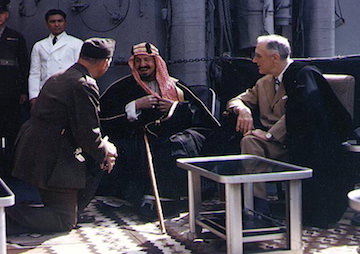 U.S. President Franklin Roosevelt with King Abdul-Aziz of Saudi Arabia in 1945 aboard the USS Quincy on the Great Bitter Lake in Egypt. The meeting is a subject of the documentary "Bitter Lake." (Cornellrockey at en.wikipedia)
U.S. President Franklin Roosevelt with King Abdul-Aziz of Saudi Arabia in 1945 aboard the USS Quincy on the Great Bitter Lake in Egypt. The meeting is a subject of the documentary "Bitter Lake." (Cornellrockey at en.wikipedia)
If you can wangle access to the BBC’s iPlayer, a viewing of Adam Curtis’ “Bitter Lake” may improve your chances of making sense of the modern world, TV critic Sam Wollaston writes at The Guardian newspaper.
Curtis is the mind behind such sensational documentaries as “The Century of Self,” “The Power of Nightmares” and “The Trap: What Happened to Our Freedom.” An excerpt from 2014’s “Wipe,” his collaboration with British satirist Charlie Brooker, recently drew the attention of some 3,500 Truthdig readers with its thesis (as summarized in a Truthdig headline) that “Modern Politicians Bewilder Us Into Submission by Treating Reality Like Conceptual Art.”
“Increasingly, we live in a world where nothing makes any sense,” Curtis says. “Events come and go like waves of a fever, leaving us confused and uncertain. Those in power tell stories to help us make sense of the complexity of reality, but those stories are increasingly unconvincing and hollow.”
At The Guardian, Wollaston writes of Curtis’ new documentary:
The Bitter Lake of the title refers to an actual saltwater lake through which the Suez canal flows, and presumably also to what you would find inside Adam Curtis’s head if you were to cut it open. In 1945 President Roosevelt met King Abdulaziz of Saudi Arabia (whose son Abdullah died last week, to be replaced by yet another son, Salman) on board a warship on the Great Bitter Lake. It was a meeting that would have extraordinary, far-reaching and unintended consequences, for the west, for the world.
Curtis’s story unfurls from there, taking in America, Saudi Arabia, Britain, the Soviet Union. And Afghanistan, which found itself not just at the centre of the world, but the centre of a snowballing – and ongoing – international scandal. It’s a story that includes the spread of Wahhabism (no wasabi jokes, thank you); the oversimplification of the world, by Reagan and Bush (Sr) and Bush (Jr) and Blair, into a kind of fairytale of good v evil; the banks, inevitably; Bin Laden and 9/11 too, also inevitably; and now Islamic State, who want pretty much exactly what the Wahhabists wanted over half a century ago.
It’s a story full of violence, bloodshed, and bitter ironies, mainly about how the west, through misunderstanding and oversimplification, repeatedly achieved pretty much the opposite of what it was trying to achieve. America protected Wahhabism through its thirst for Saudi oil, and in doing so helped sow the seeds of radical Islam today. In Afghanistan they built dams to irrigate the Helmand valley, making it perfect to sow actual seeds, opium poppy seeds. The past is strewn with patterns, and warnings, if only anyone had bothered looking and tried to understand. But history is a bit too complicated for today’s politicians.
For reasons that may be known to some of our readers but not, at this moment, to this blogger, the BBC iPlayer is unfortunately unavailable in the United States. Internet legend has it that obtainable software grants Americans access, but we wouldn’t know anything about that.
— Posted by Alexander Reed Kelly.
Your support matters…Independent journalism is under threat and overshadowed by heavily funded mainstream media.
You can help level the playing field. Become a member.
Your tax-deductible contribution keeps us digging beneath the headlines to give you thought-provoking, investigative reporting and analysis that unearths what's really happening- without compromise.
Give today to support our courageous, independent journalists.
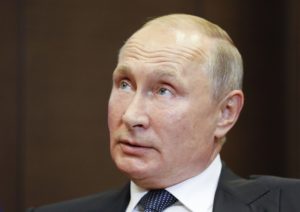
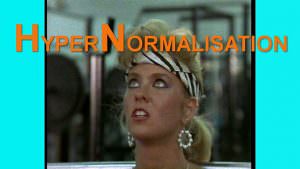
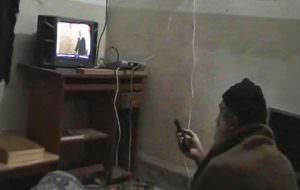
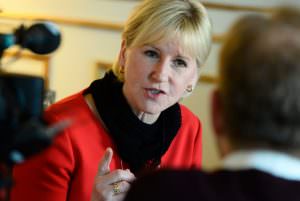
You need to be a supporter to comment.
There are currently no responses to this article.
Be the first to respond.